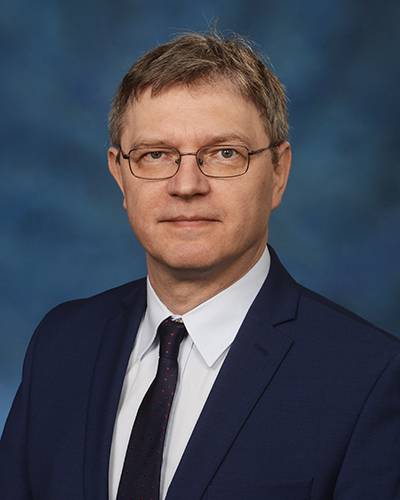Professor
Department of Diagnostic Radiology and Nuclear Medicine
Program in Image Guided Neurointerventions
Center for Advanced Imaging Research
Tumor Immunology and Immunotherapy Program
University of Maryland Marlene and Stewart Greenebaum Comprehensive Cancer Center
Phone: 410-706-7904
Email: miroslaw.janowski@som.umaryland.edu
Biosketch
Dr. Janowski completed his residency in neurosurgery at the Medical University of Warsaw, Poland, in 2009. A year later, he defended his PhD thesis in neuroscience at the Mossakowski Medical Research Centre, PAS, Warsaw, Poland. In 2011, he joined the Department of Radiology at Johns Hopkins University as a post-doctoral fellow and subsequently advanced to the position of Associate Professor in 2016.
In 2019, Dr. Janowski was recruited by the Department of Diagnostic Radiology and Nuclear Medicine at the University of Maryland, Baltimore, to establish a Program in Image Guided Neurointerventions (PIGN) - a vibrant hub at the crossroads of molecular imaging and medicine. His research interests focus on integrating advanced imaging techniques to achieve precision medicine in neurointerventions. He is pioneering the use of radiolabeling and magnetic labeling of therapeutic agents, delivering them to the central nervous system with real-time interventional PET and MR imaging. His recent work on enhancing osmotic blood-brain barrier opening and CRISPR-based genome editing is currently patent pending. He is actively exploring these research avenues further.
Dr. Janowski is the Co-Director of the Program in Image Guided Neurointerventions (PIGN).
Research Projects
Select a project below to learn more.
Image-guided, Intra-arterial Delivery of Antibodies to the Central Nervous System
Central nervous system (CNS) diseases including neurological, oncological and psychiatric conditions, are the biggest healthcare expense worldwide. Biotechnological drugs such as antibodies have shown therapeutic progress elsewhere in the body, but the blood brain barrier (BBB) limits their usefulness in CNS diseases. The benefit of macromolecules mostly comes from higher specificity and safety over traditional small molecule approaches and macromolecules such as antibodies can be more easily tagged and imaged than small molecules. We have demonstrated the feasibility of merging technologies of antibody radiolabeling and intra-arterial delivery and observed impressive benefits of this route of delivery to the brain. Will plan to perform mechanistic studies to better understand the process of antibody extravasation, which will provide key insights for widespread implementation of this technique to the clinical setting.
Warfighter Brain Health
The Warfighter Brain Health (WBH) Initiative is a joint effort between the operational and medical communities. The WBH Initiative: Strategy and Action Plan outlines the Department of Defense’s direction to better address the brain health needs of our Service members, their families, line leaders, commanders, and their communities at large. The strategy and action plan addresses brain exposures, to include blast exposures, traumatic brain injury (TBl) and long term or late effects of TBl, with the goal of optimizing brain health and countering TBI
Hyperpolarized 13C Metabolic Imaging in an Endovascular Swine Model of Ischemic Stroke
Ischemic stroke is the most frequent cause of long-term severe disability and places an enormous economic burden on society. A critical aspect in guiding treatment decisions is determining the penumbra, i.e., the region of injured brain tissue around the ischemic core that can potentially be revived. The overarching goal of this proposal is investigating the use of hyperpolarized 13C metabolic imaging in a novel endovascular pig stroke model as a new tool for improved detection of stroke penumbra that can be translated into the clinic.
Computational Approach to In Vivo Genome Editing in the Brain
The sanctuary site of the central nervous system shields it from the benefits of correcting mutations by CRISPR-based genome editing. We plan to use artificial intelligence for the in silico design of critical molecules, which are expected to overcome this limitation. While we propose to test our novel approach in unequivocally lethal amyotrophic lateral sclerosis, our expectation is that our approach can be duplicated to correct other mutations in the brain.
Nanogel Radiocarrier-based Labeling and PET Imaging of T Cells to Capture Their Tumor Penetration
The primary goal of the project is to develop a novel method of radiolabeling T cells based on radiocarriers, and not small molecules, to follow the biodistribution of T cells and their penetration to organs and solid cancers.
Lab Members
Research Associate
Guanda Qiao, MD, PhD
Postdocs: Program in Molecular Medicine (PIMM) and a Program In Neuroscience (PIN)
Abdallah Salemdawod, MD
Shalini Sharma, PhD
PhD Students
Shriya Madan - Molecular Medicine
Loryn Johnson - Neuroscience Program
Summer Undergraduate Interns
Anna Malendowicz - McGill University, Montreal, Canada
Maria Brzezinski - Elizabethtown College, Pennsylvania
Grants and Proposals
| PI | Grant Title | Total Project Period | Funding Source | Total Costs |
|---|---|---|---|---|
| Miroslaw Janowski | Image-guided, Intra-arterial Delivery of Antibodies to the Central Nervous System | 04/21 - 02/26 | NIH/NINDS | $1,931,250 |
| Miroslaw Janowski | Warfighter Brain Health | 09/21 - 09/25 | Geneva Foundation | $678,871 |
| Dirk Mayer & Miroslaw Janowski | Hyperpolarized 13C Metabolic Imaging in an Endovascular Swine Model of Ischemic Stroke | 09/23 - 08/25 | NIH/NINDS | $424,875 |
| Miroslaw Janowski | Computational Approach to In Vivo Genome Editing in the Brain | 07/24 -06/26 | Maryland Stem Cell Research Fund | $350,000 |
| Miroslaw Janowski | Nanogel Radiocarrier-based Labeling and PET Imaging of T Cells to Capture Their Tumor Penetration | 01/25 - 12/26 | American Cancer Society | $297,000 |
Total: $3,681,996
Publications
Click here to view Dr. Janowski's publications on PubMed.

